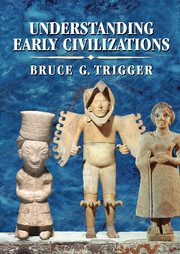Book contents
- Frontmatter
- Contents
- List of Illustrations
- Preface
- Understanding early civilizations
- Introduction
- Sociopolitical organization
- Economy
- Cognitive and symbolic aspects
- 19 Conceptions of the Supernatural
- 20 Cosmology and Cosmogony
- 21 Cult
- 22 Priests, Festivals, and the Politics of the Supernatural
- 23 The Individual and the Universe
- 24 Elite Art and Architecture
- 25 Literacy and Specialized Knowledge
- 26 Values and Personal Aspirations
- 27 Cultural Constants and Variables
- Discussion
- References
- Index
21 - Cult
Published online by Cambridge University Press: 05 June 2014
- Frontmatter
- Contents
- List of Illustrations
- Preface
- Understanding early civilizations
- Introduction
- Sociopolitical organization
- Economy
- Cognitive and symbolic aspects
- 19 Conceptions of the Supernatural
- 20 Cosmology and Cosmogony
- 21 Cult
- 22 Priests, Festivals, and the Politics of the Supernatural
- 23 The Individual and the Universe
- 24 Elite Art and Architecture
- 25 Literacy and Specialized Knowledge
- 26 Values and Personal Aspirations
- 27 Cultural Constants and Variables
- Discussion
- References
- Index
Summary
In early civilizations' relation with the supernatural, cult or ritual predominated over other forms of devotion (C. Bell 1992). The central feature of these cults was sacrifice, which has been described, along with prayer, as one of the two ‘fundamental acts of worship’ (Faherty 1974: 128), and prayer and sacrifice were closely linked. The Roman writer Sallust, although living at a time when deities were viewed both more transcendentally and more sceptically than in early civilizations, still described prayer accompanied by sacrifice as animated words – prayer supplying meaning to sacrifice and sacrifice giving power to prayer (Lewis 1990: 3).
Sacrifice has been defined as ‘a religious rite in which an object is offered to a divinity in order to establish, maintain, or restore a right relationship of man to the sacred order’ (Faherty 1974: 128). The offering transferred the life-force or power of the object from humans to the supernatural, which for early civilizations meant the forces that activated the natural world.
Anthropologists have long discussed the origins and meaning of sacrifice. Edward B. Tylor described it as gifts that fearful humans gave to their deities to win their favour or placate their hostility. William Robertson Smith argued that it constituted a form of communion of a society with its deities that involved eating the gods' totem, or earthly manifestation.
- Type
- Chapter
- Information
- Understanding Early CivilizationsA Comparative Study, pp. 472 - 494Publisher: Cambridge University PressPrint publication year: 2003



